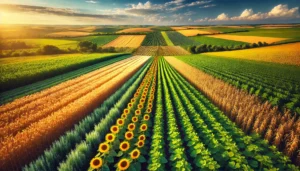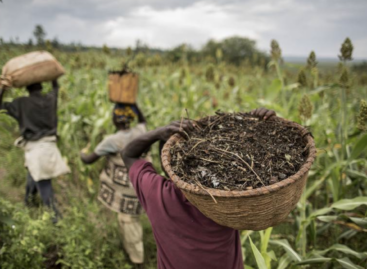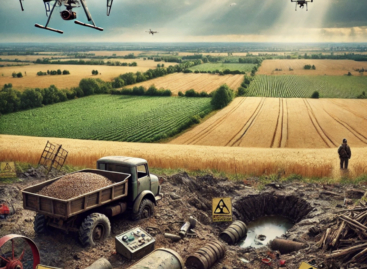There could be a serious problem with one of the important cornerstones of food production
Fertilizer is one of the most important pillars of modern food production – and it is precisely in this system that the series of geopolitical tensions is causing more and more disturbing swings. According to the head of one of the world’s largest fertilizer manufacturers, the Norwegian Yara, the war conflicts in the Middle East have once again proven how vulnerable the global agri-food chain is – the article in VG.hu points out.
 The Israeli-Iranian war in June 2025 not only greatly disrupted world oil prices but also the fertilizer market. According to Svein Tore Holsether, CEO of Yara, it is no coincidence, since 40% of the global export of urea, one of the most important raw materials for nitrogen fertilizers, passes through the Strait of Hormuz – the waterway that the Iranian army also targeted during the conflict. The fighting has led to a temporary shutdown of Israeli gas-fired fertilizer plants in Egypt, and all of Iran’s ammonia plants have been shut down for safety reasons.
The Israeli-Iranian war in June 2025 not only greatly disrupted world oil prices but also the fertilizer market. According to Svein Tore Holsether, CEO of Yara, it is no coincidence, since 40% of the global export of urea, one of the most important raw materials for nitrogen fertilizers, passes through the Strait of Hormuz – the waterway that the Iranian army also targeted during the conflict. The fighting has led to a temporary shutdown of Israeli gas-fired fertilizer plants in Egypt, and all of Iran’s ammonia plants have been shut down for safety reasons.
Industry sources say the disruptions have affected a fifth of global urea supply, but have also affected phosphate, sulphur and potash production – creating supply uncertainties across the entire fertilizer sector that could spill over into the food chain.
The Yara boss warns that if energy prices remain high for a long time – as they often do during times of war – this will inevitably be reflected in fertilizer costs and ultimately food prices. A similar chain reaction was seen in 2021-2022 after the outbreak of the war in Ukraine, when European producers scaled back or halted production due to disruptions to Russian gas supplies.
Although fertilizer prices have since consolidated, European producers remain at a competitive disadvantage: Russian fertilizers are not subject to EU sanctions, so Russian gas continues to flood the continent’s markets in processed form – urea, ammonium nitrate and other finished products. According to Norway’s Yara, this creates unsustainable competition in the long term and supports Russia’s strategic ambitions, which also uses food exports as a tool to strengthen its geopolitical influence.
In addition to the disruptions in fertilizer supplies, Holsether also drew attention to another serious problem: the persistent decline in Ukrainian agricultural capacity. About 20 percent of the country’s farmland has become unfit for farming due to the war. Before the war, Ukraine contributed to feeding about 400 million people with 50 million tons of grain exports, but this amount decreased to 78 million tons by 2023 and 72.9 million tons by 2024.
Related news

Wizz Air’s exchange rate fell by more than 10 percent
🎧 Hallgasd a cikket: Lejátszás Szünet Folytatás Leállítás Nyelv: Auto…
Read more >Related news
II. Green Gastronomy – Marketing Communication Workshop organized by the MMSZ HoReCa and Green Section
🎧 Hallgasd a cikket: Lejátszás Szünet Folytatás Leállítás Nyelv: Auto…
Read more >Retail sales of organic products in Hungary increased by 13.9% – our country is the second fastest growing market in the European Union
🎧 Hallgasd a cikket: Lejátszás Szünet Folytatás Leállítás Nyelv: Auto…
Read more >Nearly 140 domestic suppliers, 60% growth – SPAR Regions Treasures program accelerates with AI solutions
🎧 Hallgasd a cikket: Lejátszás Szünet Folytatás Leállítás Nyelv: Auto…
Read more >







